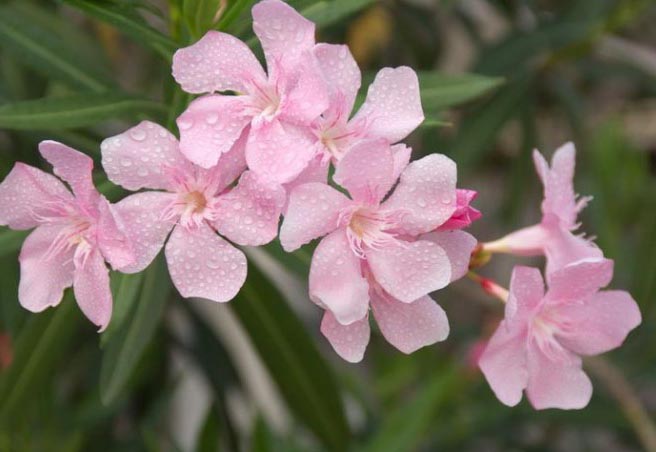The phytochemical Oleandrin shows promise in combating both cancer and COVID-19 by targeting GRP78
Nikhil Prasad Fact checked by:Thailand Medical News Team Sep 08, 2024 1 year, 3 months, 1 week, 2 days, 19 hours, 46 minutes ago
Phytochemical News: In a groundbreaking study, researchers from various prestigious institutions have identified a natural compound called oleandrin, derived from the Nerium oleander plant, that holds significant potential in suppressing both cancer and COVID-19. The study suggests that oleandrin works by targeting a protein known as GRP78, which plays a crucial role in both diseases. This
Phytochemical News report delves into the details of the study and explores how this compound could be a game changer in cancer treatment and antiviral therapies.
 The phytochemical Oleandrin shows promise in combating both cancer and COVID-19 by targeting GRP78
Oleandrin - A Dual-Purpose Treatment
The phytochemical Oleandrin shows promise in combating both cancer and COVID-19 by targeting GRP78
Oleandrin - A Dual-Purpose Treatment
The cardiac glycoside oleandrin has long been used in traditional medicine, but its potential to dually suppress cancer and COVID-19 was only recently discovered. GRP78, a protein involved in the stress response of cells, is upregulated in both cancer and viral infections, including COVID-19. The researchers, hailing from institutions like the University of Southern California-USA and Cedars-Sinai Medical Center-USA, identified that oleandrin effectively suppresses the stress induction of GRP78 in both cancer cells and cells infected by the SARS-CoV-2 virus.
Key Findings - How Oleandrin Works
Oleandrin emerged as the most potent cardiac glycoside from a study that screened several clinically relevant compounds. Its primary mechanism is inhibiting the induction of GRP78, which plays a role in helping cells survive under stressful conditions like cancer and viral infections. By reducing GRP78 levels, oleandrin impairs cancer cells' ability to resist treatment and survive, while also reducing the ability of the SARS-CoV-2 virus to replicate. Oleandrin achieves this by affecting GRP78 at a post-transcriptional level, meaning it prevents the protein from being produced efficiently, without triggering harmful degradation processes.
Cancer Applications - Oleandrin’s Role in Tumor Suppression
GRP78 is often overexpressed in various cancer types, including colorectal and breast cancers, making it a key target for therapeutic intervention. Cancer cells rely on this protein for survival under stress, and inhibiting it reduces their ability to grow and resist chemotherapy. In laboratory tests, oleandrin was shown to suppress GRP78 expression in human cancer cells, both in regular conditions and under stress factors such as nutrient deprivation and hypoxia, common in tumor environments.
Notably, the study showed that oleandrin enhances the effectiveness of chemotherapy drugs, like 5-FU and Irinotecan, by sensitizing cancer cells to these treatments. Patient-derived colon cancer organoids, which better represent human tumors, also showed reduced viability when treated with oleandrin. These findings suggest that the compound has significant potential in improving cancer treatment outcomes.
COVID-19 Applications - Fighting the Virus with Oleandrin
rong>
GRP78 is not only implicated in cancer but also plays a role in viral infections, including COVID-19. The protein assists in viral entry and replication within host cells, providing the SARS-CoV-2 virus the means to propagate efficiently. Oleandrin’s ability to suppress GRP78 translates into a reduction in viral load, making it an attractive candidate for antiviral therapy.
The research demonstrated that oleandrin reduced SARS-CoV-2 infection in human lung cells and blocked the production of the virus, including highly transmissible variants like Omicron. Interestingly, when oleandrin was combined with existing antiviral drugs such as Remdesivir, the efficacy of the treatments was significantly enhanced. This dual-action property of oleandrin presents a novel approach to both cancer and viral infections.
Understanding the Mechanism - Targeting GRP78 at Its Core
Researchers found that oleandrin specifically targets the Na+/K+-ATPase α3 isoform, a key component that influences the protein's anti-proliferative activity in cancer cells. By inhibiting GRP78, oleandrin blocks cancer cells' ability to survive and metastasize. In mouse models, where this isoform is mutated, oleandrin showed no significant effect, confirming the importance of this specific isoform in human cancer cells.
This mechanism also extends to oleandrin's antiviral activity. The research demonstrated that overexpression of GRP78 allowed the virus to resist oleandrin treatment, confirming the protein’s critical role in viral replication. These findings suggest that oleandrin's antiviral properties are closely tied to its ability to suppress GRP78.
Safety and Future Potential
One of the notable aspects of oleandrin is its relatively low toxicity at effective doses, which suggests it may be safe for use in humans. However, the study’s authors caution that more research is needed to determine the best ways to use this compound, especially in combination with other therapies. Cardiac glycosides like oleandrin have a narrow therapeutic window, meaning that they can be toxic at higher doses, particularly affecting heart function. Thus, future studies will focus on optimizing dosages and delivery methods to enhance oleandrin’s safety profile while maximizing its therapeutic potential.
Conclusions - Oleandrin’s Promise in Medicine
The study’s findings indicate that oleandrin could serve as a dual-purpose therapy, targeting both cancer and viral infections like COVID-19 by suppressing GRP78. This compound offers new hope for patients battling cancer and viral infections, particularly those resistant to current treatments. With further investigation, oleandrin could become a key component of combination therapies that fight cancer and viral diseases with higher efficacy.
The study findings were published in the peer-reviewed journal Cell & Bioscience.
https://link.springer.com/article/10.1186/s13578-024-01297-3
For the latest Phytochemical News, keep on logging to Thailand Medical News.
Read Also:
https://www.thailandmedical.news/news/researchers-discover-drug-from-oleander-plant-to-treat-htlv-i-virus,-the-deadly-cousin-of-hiv-that-15-million-people-worldwide-are-infected-with
https://www.thailandmedical.news/news/herbs-and-phytochemicals-aqueous-root-extract-of-withania-somnifera-ameliorates-lung-inflammation-caused-by-covid-19
